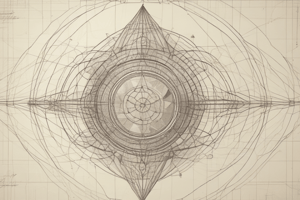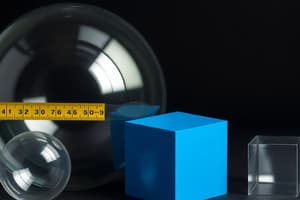Podcast
Questions and Answers
How many cubic centimeters are there in one cubic meter?
How many cubic centimeters are there in one cubic meter?
- 10,000 cm³
- 100,000 cm³
- 1,000,000 cm³ (correct)
- 1,000 cm³
What is the typical capacity of a measuring cylinder used for liquid measurement?
What is the typical capacity of a measuring cylinder used for liquid measurement?
- 250 cm³
- 500 cm³
- 1500 cm³
- 1000 cm³ (correct)
What is the volume of a cube with each side measuring 1 cm?
What is the volume of a cube with each side measuring 1 cm?
- 1 m³
- 10 cm³
- 100 cm³
- 1 cm³ (correct)
Which of the following is true about the units of volume?
Which of the following is true about the units of volume?
When measuring liquid volume with a measuring beaker, which of the following statements is correct?
When measuring liquid volume with a measuring beaker, which of the following statements is correct?
What is the primary function of a measuring cylinder?
What is the primary function of a measuring cylinder?
What procedure should be followed when adding liquid to a measuring cylinder?
What procedure should be followed when adding liquid to a measuring cylinder?
How should the volume of a liquid be read from a measuring cylinder?
How should the volume of a liquid be read from a measuring cylinder?
What is a distinguishing feature of measuring beakers compared to measuring cylinders?
What is a distinguishing feature of measuring beakers compared to measuring cylinders?
Which of the following statements concerning measuring instruments is incorrect?
Which of the following statements concerning measuring instruments is incorrect?
What is the first step in the procedure for measuring the area of an irregular object using graph paper?
What is the first step in the procedure for measuring the area of an irregular object using graph paper?
How should incomplete squares be counted when estimating the area of an irregular object?
How should incomplete squares be counted when estimating the area of an irregular object?
What conclusion can be drawn from the observation of equal masses of different substances having different volumes?
What conclusion can be drawn from the observation of equal masses of different substances having different volumes?
If a lamina results in a total count of 15 squares (where 10 are complete and 5 are more than half), what is the approximate area of the irregular object?
If a lamina results in a total count of 15 squares (where 10 are complete and 5 are more than half), what is the approximate area of the irregular object?
Which of the following materials is best suited for estimating the area of an irregular shape?
Which of the following materials is best suited for estimating the area of an irregular shape?
What is the volume of an irregular object if the initial water level is 60 mL and the water level after immersion is 80 mL?
What is the volume of an irregular object if the initial water level is 60 mL and the water level after immersion is 80 mL?
Which of the following units is equivalent to one hectare?
Which of the following units is equivalent to one hectare?
To find the area of a rectangle, which of the following formulas is used?
To find the area of a rectangle, which of the following formulas is used?
If the side of a square is 3 m, what is the area of the square in square meters?
If the side of a square is 3 m, what is the area of the square in square meters?
Which of the following statements about area is incorrect?
Which of the following statements about area is incorrect?
What is the SI unit of volume?
What is the SI unit of volume?
Which method effectively demonstrates the measurement of volume by displacement?
Which method effectively demonstrates the measurement of volume by displacement?
Which of the following statements about volume is false?
Which of the following statements about volume is false?
How can the volume of an irregular object be estimated using graph paper?
How can the volume of an irregular object be estimated using graph paper?
Which quantity is not directly associated with the measurement of volume?
Which quantity is not directly associated with the measurement of volume?
What does the rise in water level indicate in the context of measuring volume?
What does the rise in water level indicate in the context of measuring volume?
What is the relationship between cubic metres and cubic centimetres?
What is the relationship between cubic metres and cubic centimetres?
What happens when a solid object is submerged in a fluid?
What happens when a solid object is submerged in a fluid?
What intrinsic property of a substance is primarily responsible for the difference in mass when equal volumes of different substances are compared?
What intrinsic property of a substance is primarily responsible for the difference in mass when equal volumes of different substances are compared?
When equal masses of iron and sugar are compared, what observation can be made regarding their volumes?
When equal masses of iron and sugar are compared, what observation can be made regarding their volumes?
In an experiment comparing cubes made of different materials, which statement about the mass rankings is correct?
In an experiment comparing cubes made of different materials, which statement about the mass rankings is correct?
Why does the milk-filled tumbler weigh more than the water-filled tumbler despite being the same volume?
Why does the milk-filled tumbler weigh more than the water-filled tumbler despite being the same volume?
In the activity of comparing cubes made from different materials, which material is expected to have the highest mass per identical volume?
In the activity of comparing cubes made from different materials, which material is expected to have the highest mass per identical volume?
Which statement accurately describes the relationship between the masses of the substances mentioned?
Which statement accurately describes the relationship between the masses of the substances mentioned?
How does temperature affect the density of a substance?
How does temperature affect the density of a substance?
What is the SI unit of density?
What is the SI unit of density?
Given that density is defined as mass per unit volume, if a material has a volume of $2 m³$ and a mass of $3000 kg$, what is its density?
Given that density is defined as mass per unit volume, if a material has a volume of $2 m³$ and a mass of $3000 kg$, what is its density?
Which of the following correctly compares the densities of the given materials?
Which of the following correctly compares the densities of the given materials?
When using the displacement method to measure the volume of an irregular solid, which of the following must be done to ensure accurate readings?
When using the displacement method to measure the volume of an irregular solid, which of the following must be done to ensure accurate readings?
What is the primary reason why water behaves differently than most substances when its temperature changes?
What is the primary reason why water behaves differently than most substances when its temperature changes?
Which formula must be applied to obtain the density of a regular solid?
Which formula must be applied to obtain the density of a regular solid?
What unit of volume is equivalent to 1 mL in the context of this content?
What unit of volume is equivalent to 1 mL in the context of this content?
What physical property is primarily measured to determine the density of both regular and irregular solids?
What physical property is primarily measured to determine the density of both regular and irregular solids?
What is the purpose of using a measuring cylinder in the process described?
What is the purpose of using a measuring cylinder in the process described?
What does V₂ - V₁ represent in the calculation process?
What does V₂ - V₁ represent in the calculation process?
Which formula correctly calculates the volume of a cone?
Which formula correctly calculates the volume of a cone?
What is the method used to determine the volume of an irregularly shaped object?
What is the method used to determine the volume of an irregularly shaped object?
In measuring liquid volume with a beaker, what is the first step?
In measuring liquid volume with a beaker, what is the first step?
Which of the following accurately describes the volume of a cuboid?
Which of the following accurately describes the volume of a cuboid?
When using the method of measuring liquid volume with a beaker, what is the next step after filling the beaker with a measured liquid?
When using the method of measuring liquid volume with a beaker, what is the next step after filling the beaker with a measured liquid?
If a cylinder has a radius of 3 cm and a height of 5 cm, what is the volume calculated using the formula?
If a cylinder has a radius of 3 cm and a height of 5 cm, what is the volume calculated using the formula?
What is the primary purpose of measuring the mass of the empty beaker in the process of determining density?
What is the primary purpose of measuring the mass of the empty beaker in the process of determining density?
Which of the following correctly describes the relationship between mass and density for a substance?
Which of the following correctly describes the relationship between mass and density for a substance?
If a substance has a density less than 1 g/cm³, which of the following is likely true?
If a substance has a density less than 1 g/cm³, which of the following is likely true?
What is the significance of using mercury in barometers?
What is the significance of using mercury in barometers?
When determining the density of a liquid, why is it necessary to find the difference in mass before and after the liquid is added to the beaker?
When determining the density of a liquid, why is it necessary to find the difference in mass before and after the liquid is added to the beaker?
Which of the following substances has the highest density listed in the provided data?
Which of the following substances has the highest density listed in the provided data?
If two objects are observed to travel the same distance over an equal time interval, which statement is correct?
If two objects are observed to travel the same distance over an equal time interval, which statement is correct?
What unit is commonly used to express both mass and density in the density calculation?
What unit is commonly used to express both mass and density in the density calculation?
Flashcards are hidden until you start studying
Study Notes
Measuring Volume
- Volume is the space occupied by an object.
- SI unit of volume is cubic meter (m³).
- Other units are cubic centimeter (cm³).
- 1 m³ = 1000000 cm³
- 1 cm³ = 1 mL
- Volume of a cube = (one side)³
- Volume of a cuboid = length × breadth × height
- Volume of a sphere = $\frac{4}{3} \pi \times (radius)^{3}$
- Volume of a cylinder = $\pi \times (radius)^{2} \times height$
Measuring the volume of liquids
- Use a measuring cylinder or measuring beaker.
- Graduated markings represent cubic centimeters (cm³) or milliliters (mL).
- Volume of liquid can be expressed in liters (L).
- 1 m = 100 cm
Measuring the volume of irregular objects
- Use the displacement method
- Submerge the object in a measuring cylinder filled with water.
- The difference between the initial and final water levels represents the volume of the object.
Measuring the volume of a cone
- Volume of a cone = $\frac{1}{3} \times \pi \times (radius)^{2} \times height$
Measuring Area
- Area is the surface occupied by an object.
- SI unit for area is square meter (m²).
- 1 m² = 1 m × 1 m
- Other units of area:
- One are: 100 m²
- One hectare: 10,000 m²
- One square kilometer: 1,000,000 m²
- Area of a square: (side)²
- Area of a rectangle: length × breadth
- Area of a circle: π × (radius)²
Measuring the area of irregular objects
- Use graph paper to estimate the area.
- Count complete squares and incomplete squares that are at least half within the boundary.
Density
- Density is the mass of a unit volume of a substance.
- SI unit of density is kg/m³.
- CGS unit of density is g/cm³.
- 1 kg/m³ = 1 g/cm³
Determining Density of Regular Solids
- Measure the mass using a beam balance.
- Measure the volume using the formula V = length × breadth × height.
- Calculate density using the formula: Density (d) = mass (M) / volume (V)
Determining Density of Irregular Solids
- Measure the mass using a beam balance
- Measure the volume using the displacement method (submerge the object in water and measure the volume of water displaced).
- Calculate density using the formula: Density (d) = mass (M) / volume (V)
Determining Density of a Liquid
- Measure the mass of an empty beaker.
- Pour a known volume of liquid into the beaker.
- Measure the mass of the beaker with the liquid.
- Calculate the density using the formula: Density (d) = mass (M) / volume (V)
Speed
- Speed is the rate at which an object moves.
- The faster an object moves, the greater its speed.
- Distance is the length of the path traveled.
- SI unit of distance is meter (m).
Studying That Suits You
Use AI to generate personalized quizzes and flashcards to suit your learning preferences.




